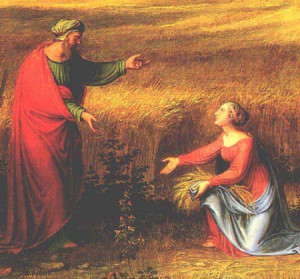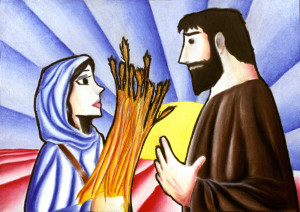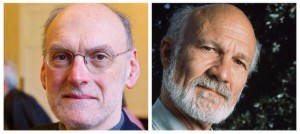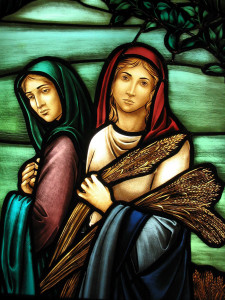 Ruth 1:6,19-22
Ruth 1:6,19-22
6 Then she arose with her daughters-in-law to return from the country of Moab, for she had heard in the fields of Moab that the Lord had visited his people and given them food.
19 So the two of them went on until they came to Bethlehem. And when they came to Bethlehem, the whole town was stirred because of them. And the women said, “Is this Naomi?” 20 She said to them, “Do not call me Naomi; call me Mara, for the Almighty has dealt very bitterly with me. 21 I went away full, and the Lord has brought me back empty. Why call me Naomi, when the Lord has testified against me and the Almighty has brought calamity upon me?” 22 So Naomi returned, and Ruth the Moabite her daughter-in-law with her, who returned from the country of Moab. And they came to Bethlehem at the beginning of barley harvest.
Have you ever been in a store or country restaurant or something along those lines and seen this sign: “Lost Dog. Three legs. Blind in one eye. Missing right ear. Tail broken. Accidentally neutered. Answers to the name ‘Lucky’”?
The joke is, of course, in the surprising disjunction between the dog’s description and the dog’s name.
Naomi would have gotten that joke. In her own mind, Naomi was that joke. For Naomi means “pleasantness” or “sweetness,” but her life had become anything but. In our text, Naomi, “pleasantness,” returned to her home broken and defeated. More than that, she returned bitter. This is because she believed that God had dealt bitterly with her.
Nonetheless, she returned to the small town of Bethlehem, her hometown. She returned with her foreign daughter-in-law, Ruth, in tow. And when she returned, the townswomen gathered around to gawk at her.
This is the scene that unfolds before us. If we read it carefully, we will be able to understand the reason for Naomi’s bitterness and we will be better equipped to evaluate our own, should bitterness come into our lives.
Naomi’s bitterness was the result of very real pain and loss.
I do not wish to sit aloof and cast cold judgment on Naomi. To be sure, I will judge a bit, but I will do so very carefully. That is because whatever blind spots Naomi had developed, there was indeed very real pain and very real loss behind the frame of mind in which we find her in our text.
19 So the two of them went on until they came to Bethlehem. And when they came to Bethlehem, the whole town was stirred because of them. And the women said, “Is this Naomi?” 20 She said to them, “Do not call me Naomi; call me Mara, for the Almighty has dealt very bitterly with me. 21 I went away full, and the Lord has brought me back empty. Why call me Naomi, when the Lord has testified against me and the Almighty has brought calamity upon me?”
“I went away full, and the Lord has brought me back empty.”
People have wondered at that saying. The beginning of chapter 1 tells us that she and her husband and sons left because famine had gripped the land. In what sense, then, had she gone away full?
An early Jewish commentary on Ruth called Ruth Rabbah deduced from Ruth’s statement that Elimelech, her husband, did not take the family away from their home in search of food per se but rather because he was wealthy and did not want to have to share his wealth with the townspeople during a difficult time. And this particular commentary further theorizes that this is why Elimelech and his sons died in Moab.[1]
That is, to be a sure, a provocative hypothesis, but also a fairly uncharitable one. The most natural reading would be that she is referring to her husband and her sons. When she left, they were alive and they were all a family together. Whether they had money or not, they had each other. But now, she was returning empty. In this approach, the emptiness refers to her deceased husband and sons. I do believe that this is what is happening, for almost certainly Naomi would have wanted to address the elephant in the room, if, that is, word had not already gotten back home in some other way.
Whatever we may think of Naomi, let us remember this: this is a woman who had undergone very real loss, and, simply put, nothing mitigates against our trust in God and our faith more than the existence of pain and suffering and devastating loss.
Joseph Heller’s novel Catch-22 is widely considered a masterpiece in 20th century comedic literature. That being said, it is also a very serious work in many ways and, at times, a very troubling work. For instance, consider this scene in which Yossarian launches a diatribe against God while speaking to Lieutenant Scheisskopf’s wife. Ironically, both are atheists, but they are arguing about the kind of God they do not believe in.
“And don’t tell me God works in mysterious ways,” Yossarian continued, hurtling on over her objection. “There’s nothing so mysterious about it. He’s not working at all. He’s playing. Or else He’s forgotten all about us. That’s the kind of God you people talk about – a country bumpkin, a clumsy, bungling, brainless, conceited, uncouth hayseed. Good God, how much reverence can you have for a Supreme Being who finds it necessary to include such phenomena as phlegm and tooth decay in His divine system of creation? What in the world was running through that warped, evil, scatological mind of His when He robbed old people of the power to control their bowel movements? Why in the world did He ever create pain?”
“Pain?” Lieutenant Scheisskopf’s wife pounced upon the word victoriously. “Pain is a useful symptom. Pain is a warning to us of bodily dangers.”
“And who created the dangers?” Yossarian demanded. He laughed caustically. “Oh, He was really being charitable to us when He gave us pain! Why couldn’t He have used a doorbell instead to notify us, or one of His celestial choirs? Or a system of blue-and-red neon tubes right in the middle of each person’s forehead. Any jukebox manufacturer worth his salt could have done that. Why couldn’t He?”
“People would certainly look silly walking around with red neon tubes in the middle of their foreheads.”
“They certainly look beautiful now writhing in agony or stupefied with morphine, don’t they? What a colossal, immortal blunderer! When you consider the opportunity and power He had to really do a job, and then look at the stupid, ugly little mess He made of it instead, His sheer incompetence is almost staggering. It’s obvious He never met a payroll. Why, no self-respecting businessman would hire a bungler like Him as even a shipping clerk!”
Lieutenant Scheisskopf’s wife had turned ashen in disbelief and was ogling him with alarm. “You’d better not talk that way about Him, honey,” she warned him reprovingly in a low and hostile voice. “He might punish you.”
“Isn’t He punishing me enough?” Yossarian snorted resentfully. “You know, we mustn’t let Him get away with it. Oh, no, we certainly mustn’t let Him get away scot free for all the sorrow He’s caused us. Someday I’m going to make Him pay. I know when. On the Judgment Day. Yes, That’s the day I’ll be close enough to reach and grab that little yokel by His neck and –“
“Stop it! Stop it!” Lieutenant Scheisskopf’s wife screamed suddenly, and began beating him ineffectually about the head with both fists. “Stop it!”
…”What…are you getting so upset about?” he asked her bewilderedly in a tone of contrite amusement. “I thought you didn’t believe in God.”
“I don’t,” she sobbed, bursting violently into tears. “But the God I don’t believe in is a good God, a just God, a merciful God. He’s not the mean and stupid God you make Him out to be.”
Yossarian laughed and turned her arms loose. “Let’s have a little more religious freedom between us,” he proposed obligingly. “You don’t believe in the God you want to, and I won’t believe in the God I want to. Is that a deal?”[2]
Or consider dying Ivan Ilyich’s anger at God in Leo Tolstoy’s novel, The Death of Ivan Ilyich.
He cried about his helplessness, about his terrible loneliness, about the cruelty of people, about the cruelty of God, about the absence of God.
“Why hast Thou done all this? Why hast Thou brought me to this? Why dost Thou torture me so? For what?”
He did not expect an answer, and he cried because there was no answer and there could be none. The pain started up again, but he did not stir, did not call out. He said to himself: “Go on then! Hit me again! But what for? What for? What have I done to Thee?”[3]
Or consider Voltaire’s Poeme sur le desastre de Lisbonne that was his complaint against God for allowing the 1755 Lisbonne earthquake to happen. That earthquake hit on Sunday, All Saint’s Day, 1755. Between the 9.0 Richter force quake, the fire that swept Lisbonne, the massive tsunami that hit a half-hour after the earthquake began (killing many who were trying to flee up the Tagus River to escape), and the disease and pestilence that spread out from Lisbonne to Portugal and North Africa, well over 70,000 people died. So Voltaire penned his complaint, which reads in part:
These women, these infants heaped one upon the other, these limbs scattered beneath shattered marbles; the hundred thousand unfortunates whom the earth devours, who – bleeding and torn, still palpitating, interred beneath their roofs – end their lamentable days without comfort, amid the horror of their torment.
What crime and what sin have they committed, these infants crushed and bleeding on their mothers’ breasts?
No, no longer place these immutable laws of necessity before my agitated heart, this chain of bodies, spirits, and worlds. O the dreams of savants! O how profoundly chimerical! God holds the chain in his hand, and he is not in any way enchained; by his beneficent will all is determined; he is free, he is just, he is never implacable. Why then do we suffer under so equitable a master?[4]
My point in mentioning all of this (and many more examples could be cited!) is simply to say that Naomi’s response is quite natural given her devastating loss.
20 She said to them, “Do not call me Naomi; call me Mara, for the Almighty has dealt very bitterly with me. 21 I went away full, and the Lord has brought me back empty. Why call me Naomi, when the Lord has testified against me and the Almighty has brought calamity upon me?”
Perhaps you have felt like that. Perhaps you feel like that right now. The sentiment is understandable as a raw emotional response. However, as people of God, we need to speak back to our own bitterness and our own pain with gospel truth. So allow me to make two further observations about Naomi’s bitterness that I think must be made.
Naomi’s bitterness was the result of her refusal to imagine that God might be creatively blessing her in unforeseen and nearby ways.
It could just be that pain oftentimes blinds us to God’s more creative blessings. I would propose that this happened in the case of Naomi. As you hear her complaint, you will notice something interesting about the way in which she refers to God.
20 She said to them, “Do not call me Naomi; call me Mara, for the Almighty has dealt very bitterly with me. 21 I went away full, and the Lord has brought me back empty. Why call me Naomi, when the Lord has testified against me and the Almighty has brought calamity upon me?” 22a So Naomi returned, and Ruth the Moabite her daughter-in-law with her, who returned from the country of Moab.
In verse 20 and the end of verse 21, Naomi refers to God as “the Almighty.” In doing so, she is using the Hebrew word shaddai, “almighty.” Many of you will remember the great Christian song “El Shaddai” from some years back. This is that word, but without the “El.” “El Shaddai” means “God Almighty,” but Naomi refers to God simply as “Shaddai,” “the Almighty.” That is interesting because the “el” is almost never dropped from that divine title unless somebody is speaking in poetic form. In prose, it is very unusual. But this is the word that Naomi uses in her complaint.
Leon Morris has offered some helpful insights on the word and what is likely happening here.
Naomi thinks of the irresistible power of God. When he determined that bitterness should enter her life there was no other possibility. It is worth noticing that, while the name šadday is sometimes used in contexts of blessing, it is also found when it is the severity as well as the power of the Lord that is in mind (e.g. Isa. 13: 6; Joel 1: 15). This is one of very few places where it stands alone in prose (this is not unusual in poetry, but in prose ‘God Almighty’ is more common). F. I. Andersen points out that Naomi’s speech may well be poetry. In verse 22 šadday is found in good, poetic parallelism.
The divine name rendered the Almighty in Ruth 1: 21 is the Hebrew šadday. This term is used in this way forty-eight times. It is especially common in the book of Job where it is found thirty-one times. In prose it is often linked with ’el in the expression translated ‘God almighty’, but in poetry it commonly stands alone, though ’el may be used in parallelism (e.g. Job 8: 3)…
When Naomi then says ‘šadday hath dealt very bitterly with me’ and ‘šadday hath afflicted me’ (Ruth 1: 20f., AV) the emphasis will be on God’s great power. He cannot be resisted. If he sends disaster on anyone, that disaster cannot be averted. The book, of course, goes on to bring out the complementary thought that God in his grace has mercy on his people. But our author does not choose to use this name of God when he brings out the point.[5]
With that in mind, remember that we early noted how Ruth the Moabitess took the name of God, Yahweh, on her lips in responding to Naomi’s earlier plea for her to return to Moab with Orpah. In other words, Ruth, a foreigner, takes the name Yahweh in her trust but Naomi, a Jew, refers to Him oddly as the Almighty in her bitterness.
It is almost as if Naomi is coldly referring to God as “the Power” to explain her pain. There is an indictment here. “The Almighty, the Power, has testified against me and brought calamity upon me. He did this to me!” Moffatt translates verse 20 as, “call me Mara, for the Almighty has cruelly marred me.”[6]
Hardee Kennedy makes the interesting proposal that “Naomi’s spirit was not less harsh than that of the gossiping women who judged her. Indeed, the religious viewpoint from which she interpreted her misfortune as divine punishment was essentially the same as theirs.”[7] Fascinating! Many of the Bethlehemite women were undoubtedly judging Naomi whereas Naomi was judging God!
But do you notice a kind of poignant irony that the author of Ruth slips in there?
20 She said to them, “Do not call me Naomi; call me Mara, for the Almighty has dealt very bitterly with me. 21 I went away full, and the Lord has brought me back empty. Why call me Naomi, when the Lord has testified against me and the Almighty has brought calamity upon me?” 22a So Naomi returned, and Ruth the Moabite her daughter-in-law with her, who returned from the country of Moab.
“I went away full,” Naomi complains, “and the Lord has brought me back empty.”
“I have nothing!”
“I have nothing!”
And then the author of Ruth says this in verse 22: “So Naomi returned, and Ruth the Moabite her daughter-in-law with her, who returned from the country of Moab.”
While Noami is bitterly complaining about how God has taken everything from her and how God has testified against her and how God has wounded her and how the Almighty has ruined her, who is standing right behind her hearing all of this?
Ruth!
If you read this rightly, a terrible feeling of awkwardness starts coming over you. How did Ruth feel standing there hearing this? How did the women feel hearing this and cutting eyes nervously at this odd foreign girl standing behind her? And how could Naomi have allowed her pain to blind her to such an extent that she never stopped to think that all her loss, and all the pain that God allowed, and all the misery and the tears and the funerals and the loss might have been for His unforeseen, creative, and right-under-her-nose purpose of getting Ruth to Judah so she could eventually become King David’s great-grandmother, one of the heroine’s of Israel’s story, and eventually take her place in Matthew 1 in the genealogy of the Lord Jesus herself?
Church, I am not trying to be cold and stoic about your pain, but is it not just possible that sometimes it is not always about us? Is it possible that God has a plan that goes beyond us and that if He must at times use pain to bring about a greater good for the world He will do so?
Naomi was too busy whining to stop and consider the possibility that this weird extra baggage standing sheepishly behind her might be the whole point of the great drama she found herself in.
Naomi’s bitterness was the result of her allowing the moon of her personal tragedy to eclipse the sun of God’s larger, more amazing blessings.
Furthermore, Naomi allowed her pain to eclipse the greater blessings of God on others. Do you remember why Naomi went to Moab in the first place?
6 Then she arose with her daughters-in-law to return from the country of Moab, for she had heard in the fields of Moab that the Lord had visited his people and given them food.
There you go. They went to Moab in the first place because there was no food in Judah. There was no food! And did you notice the last little sentence of our text?
22 So Naomi returned, and Ruth the Moabite her daughter-in-law with her, who returned from the country of Moab. And they came to Bethlehem at the beginning of barley harvest.
Have you ever seen an eclipse? A solar eclipse is when the moon passes between the earth and the sun, obscuring the sun in part or in whole. Now, I find this fascinating. It is fascinating because the moon is relatively small. The moon is 27% the size of the earth. The moon has a radius of 1,079.6 miles. The earth’s radius is 3,959 miles. So the moon is relatively small compared the earth. But the earth is very small compared to the sun. The sun has a radius of 432,450 miles. That means that the sun’s radius is about 110 times the radius of the earth.
But that raises a question. How on earth (no pun intended) can an object that is 75% smaller than the earth essentially blot out an object that is 110 times larger than the earth?
The answer is that although the sun’s diameter is 400 times larger than the moon, the sun is 400 times farther away. So a smaller object that is closer to us can blot out a much larger object that is farther from us.
I propose to you that this is what is happening to Naomi in our text and this is what happens to you and to me all the time! Our pain and our loss and our tragedy is the moon. Compared to the wider world, it is relatively small, true, but it is oh so close. But behind the moon of our own circumstances is the gigantic sun of God’s greater and wider and deeper work in the world, but these seem far away in moments of pain and suffering.
So we return to the barley harvest.
22 So Naomi returned, and Ruth the Moabite her daughter-in-law with her, who returned from the country of Moab. And they came to Bethlehem at the beginning of barley harvest.
The text allows us to identify when the events that we are reading about happened since it locates them “at the beginning of barley harvest,” which is mid-to-late-April.[8]
They left Judah because of a famine. There was no food.
In Moab, calamity befell Naomi.
She returned to Judah because she heard God had removed the famine. They returned “at the beginning of barley harvest.”
When Naomi returned to Bethlehem and launches her bitter complaint against God, she allows the moon of her own suffering to eclipse and blind her to two amazing blessings: (1) the young lady standing behind her and (2) the men and women working the barley harvest standing behind the ladies.
All around Naomi were the deep, deep blessings of a good and merciful God but she could not and would not see it. Why? Because she had allowed her pain to get so close that it blotted out the horizon. It was all she could see.
Dear friends, God does not begrudge your pain, your tears, your questions, your fears…God is not stoic and unfeeling toward you! But hear me: if you allow your personal loss and your personal pain to get so close that it eclipses everything else around you, you are going to miss out on some amazing things that God is doing!
God knows this. God knows that we can only see 10 inches in front of our own faces. We are all obsessed with and dominated by the small moon of our own reality. But God knows the principle: that that which is closest determines how we do and do not see everything else. So God looked upon our blindness and said, “Then I will simply have to get even closer.”
And that is why Jesus came.
Jesus is Immanuel, God with us, God in front of us, God in our faces eclipsing the moon of our own pain with His saving sacrifice and audacious love.
The Christian only allows pain and loss to have dominance when they allow that pain and that loss to get between them and Jesus. But Jesus came to get between you and your pain. Our sight should be dominated by the cross on which He consumed our pain in His own.
Let Jesus get between you and your bitterness. View your bitterness through the lens of Jesus instead of viewing Jesus through the lens of your bitterness and amazing things will begin to happen!
Beware the example of Naomi. There are blessing standing all around you. And the blessing is named Jesus. And He loves you very much. Lift up your eyes and look upon Him!
[1] Kirsten Nielson, Ruth. The Old Testament Library. (Louisville, KY: Westminster John Knox Press, 1997), p.51.
[2] Joseph Heller, Catch-22 (New York, NY: Everyman’s Library, 1995), p.223-224.
[3] Leo Tolstoy, The Death of Ivan Ilyich. (New York, NY: Bantam Dell, 1981), p.100.
[4] David Bentley Hart, The Doors of the Sea. (Grand Rapids, MI: Wm. B. Eerdman’s Publishing Co., 2005), p.16-22.
[5] Arthur E. Cundall and Leon Morris (2008-09-19). TOTC Judges & Ruth (Tyndale Old Testament Commentaries) (Kindle Locations 3836-3841, 3860-3863, 3913-3916). Inter-Varsity Press. Kindle Edition.
[6] Quoted in Arthur E. Cundall and Leon Morris (2008-09-19). TOTC Judges & Ruth (Tyndale Old Testament Commentaries) (Kindle Locations 3833-3834). Inter-Varsity Press. Kindle Edition.
[7] J. Hardee Kennedy, Ruth. The Broadman Bible Commentary. Vol. 2. Gen. Ed., Clifton J. Allen (Nashville, TN: Broadman Press, 1970), p.470.
[8] John H. Walton, Victor H. Matthews and Mark W. Chavalas, The IVP Bible Background Commentary: Old Testament. (Downers Grove, IL: InterVarsity Press, 2000), p.278.
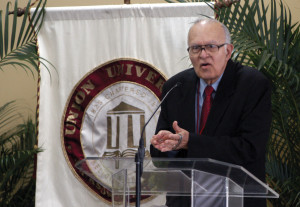 In the 1990’s, Baptist representatives from the Baptist World Alliance (BWA) entered into “pre-conversations” with authorities in the Greek Orthodox Church. These conversations, regrettably, did not continue for very long. I quote here from Ken Manley’s “A Survey of Baptist World Alliance Conversations With Other Churches: Some Implications for Baptist Identity” from July of 2002, posted on the BWA website.
In the 1990’s, Baptist representatives from the Baptist World Alliance (BWA) entered into “pre-conversations” with authorities in the Greek Orthodox Church. These conversations, regrettably, did not continue for very long. I quote here from Ken Manley’s “A Survey of Baptist World Alliance Conversations With Other Churches: Some Implications for Baptist Identity” from July of 2002, posted on the BWA website.
